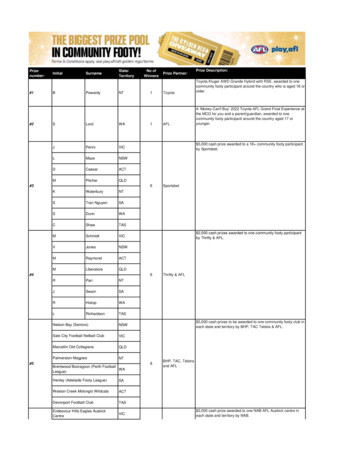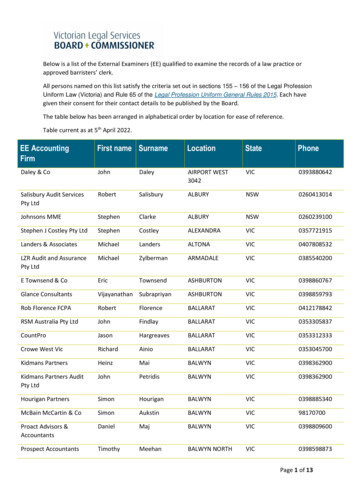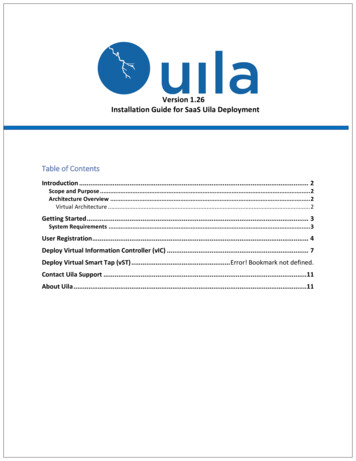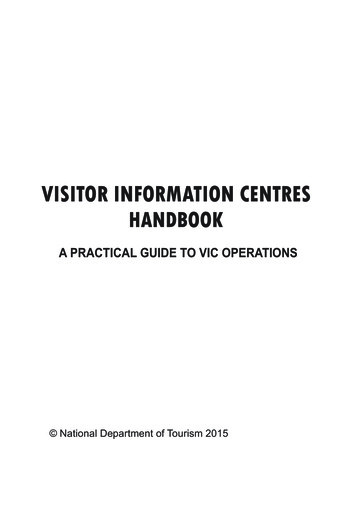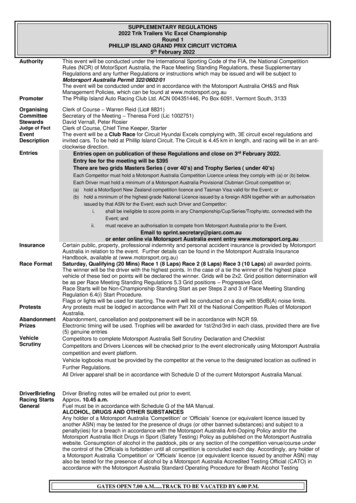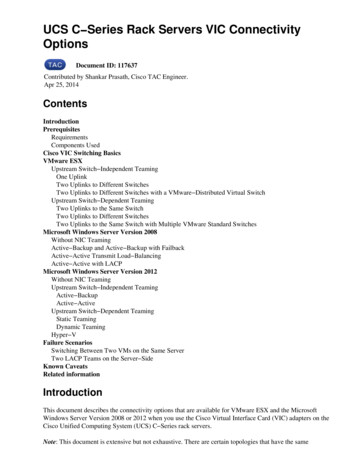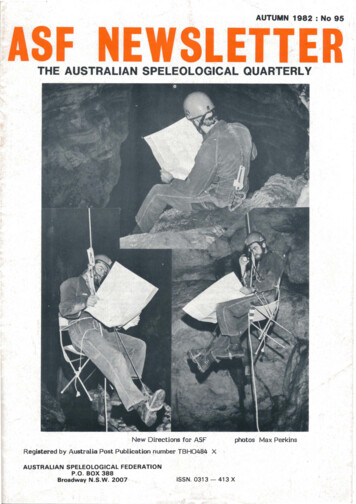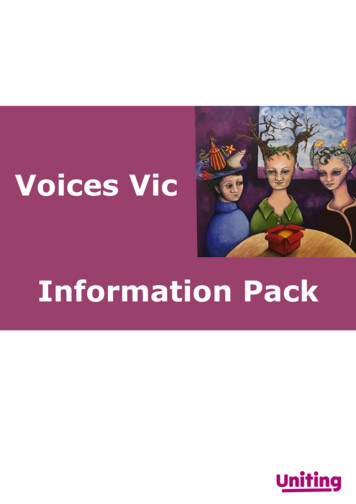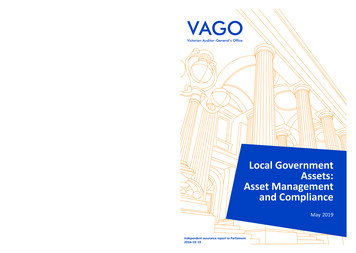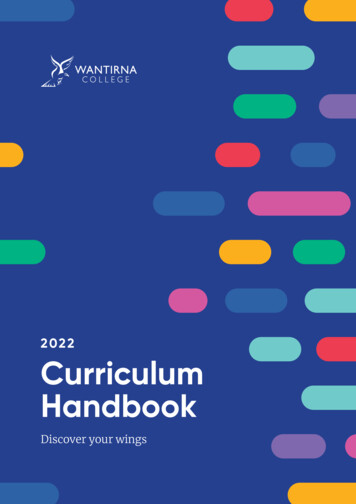
Transcription
2022CurriculumHandbookDiscover your wings
ContentsYear 7 and 8 Curriculum Overview3English4Health and Physical 10Technology11The Arts13Year 7 and 8 Curriculum Enhancement and Support14Year 9 and 10 Curriculum Overview16English17Health and Physical ence34Technology38The Arts43Year 9 Outdoor Education52VCE Curriculum Overview53VCE Curriculum at a Glance56VCE Study Summaries57VCAL Curriculum Overview96VET Curriculum Overview98VET Offerings at a Glance992
2022 Curriculum HandbookYear 7 & 8CurriculumOverview
Year 7 and 8 Curriculum OverviewOur Year 7 and 8 curriculum is a broad and comprehensive academic program based on the Victorian Curriculum F-10. It isstructured to ensure students are exposed to a wide range of subjects and have the opportunity to sample every subjectwe offer at entry level. Students choose which Language they will study, Spanish or Chinese; all other subjects are coreexperiences and are undertaken by all students.The Victorian Curriculum F-10 is structured around discipline -based learning and capabilities.Learning Areas - Discipline based learning.Our Year 7 and 8 curriculum is developed to increase students’ depth of knowledge in English (literacy) and Mathematics(numeracy) and build their breadth of knowledge through a range of studies in Science, The Arts, Technology, Humanities,Languages and Health and Physical Education.Capabilities.The Victorian Curriculum F-10 capabilities are a set of discrete knowledge and skills that are taught through the learning areas.The four capabilities in the Victorian Curriculum F-10 are: Critical and Creative Thinking Ethical Intercultural Personal and SocialEach subject ensures students develop an understanding of the discipline and subject content whilst developing, practisingand demonstrating the capabilities in, and through, their learning across the curriculum.Year 7 EnglishOne of the cornerstones of strong literacy skills is reading and a key component of the English course in the first year ofWantirna College is the introduction of the Independent Reading Program which spans Years 7-9. Students are activelyinvolved in the selection of texts for this program which, through special workshops, teaches a number of key strategies suchas predicting, questioning, making connections and inferring to enable better reading comprehension skills. These skills areconstantly practised and developed during regular reading times and with the class texts that are explored during the year,namely biographical texts, a class novel, short stories, a film text and poetry. Students are also involved in special conferenceswith teachers and parent volunteers to monitor their reading skills.With a focus on Literacy for Learning strategies, the teaching of grammar is integrated into the curriculum. Students follow aspelling program that encourages regular spelling testing and also improves vocabulary. In addition, students put togethera portfolio of written pieces across the year, including biographies, stories, poetry and persuasive pieces. students areencouraged to engage with their writing as a writer. The flexibility of our teaching space allows teachers to differentiate thecurriculum and encourage students to improve their ability to write for different purposes and audiences. An important part ofthe writing process is noting down thoughts, feelings and observations about the world around us – the Writer’s Notebook isthe tool that allows students to do just this. From their Writer’s Notebook, students are able to develop ideas into a piece ofwriting. The Writer’s Notebook is a personal place where students create and keep their initial ‘Low Stakes’ writing.Constant opportunities are provided throughout the year for students to improve their skills in speaking and listening. After aninitial transition period where students work closely with their English teacher, students are mixed in a variety of groupings toencourage teamwork. Formal assessment of oral presentation skills occurs throughout the course and includes an introductorytalk at the start of the year that allows students to introduce themselves to their home groups and teachers. Easy access tostudents’ own laptops allows for seamless integration of digital tools and multimodal texts.4
Year 8 EnglishAs far as possible, English at Year 8 is taught in the specialist literacy building known as Byrne House. The Centre houses sixclassrooms and a flexible central learning area. In addition, two pairs of classrooms are separated by large sliding doors,allowing them to become larger spaces that further facilitate flexibility in teaching and learning.The course at Year 8 builds on the skills gained in Year 7. Students continue with the Independent Reading program,choosing from a wide range of up to date texts across a range of genres. They are encouraged to apply the reading andcomprehension strategies of Independent Reading during regular reading times and workshops and during the study of classtexts. In line with the new Victorian Curriculum for English, a number of innovative units of study are undertaken, including theexploration of a range of stories, poems and other texts that draw on indigenous Australian and Asian cultures, the analysis ofnews reporting in a range of media and the reading of gothic written and film texts. A number of written tasks are integratedinto these units, which encourage the development of writing in different forms for different purposes and audiences andinclude stories, poems, analytical text response essays as well as more informal pieces.The improvement of writing skills is a school-wide priority and our teaching is underpinned by Literacy for Learning with a focuson register, noun groups and nominalisation. The spelling program ensures students employ new words in sentences and findantonyms and synonyms to extend their vocabulary. Students continue to use the Writer’s Notebook as an invaluable toolfor exploring their thoughts, feelings and observations about the world around them and then develop these ideas into moreformal pieces of writing. Students are given the opportunity to become more confident and articulate in their speaking skillsby participating in group and individual presentations and formal debates. Pair and group discussion and peer evaluationare a constant feature of the English classroom. Easy access to laptops allows for seamless integration of digital tools andmultimodal texts.Year 7 Health & Physical EducationThe focus at Year 7 is on the development of the skills needed to work effectively in a group as well as motor skills, includingthrowing, catching, kicking and striking. Students will also explore the concept of fitness and participate in a range of fitnesstests. At the conclusion of the year, students will be introduced to the Sport Education in Physical Education Program (SEPEP).This will expose students to a range of different roles required in sport, such as umpiring, scorekeeping and coaching. Acomplete set of College Physical Education uniform (including College cap) is required.Year 7 Health promotes attitudes and behaviours that support equality and respect among school-aged children. Studentslearn to appreciate diversity and valuing individual differences and perspectives. It encourages positive attitudes andbehaviours that enable students to make informed decisions regarding respectful relationships. Students explore factors thatinfluence an individual’s overall health, including body image, self-esteem, nutrition and physical activity.The curriculum includes the Peer Support program which involves small groups of Year 7 students working closely with speciallytrained Year 10 students during Semester 1. The older students assist the Year 7 students in their transition to their new schoolby providing a first point of contact and by assisting them with adjusting to life at Wantirna College. Discussions, games andother self-confidence and support activities make up the main approaches in this subject. The topics covered in this programinclude transition issues, mentoring, self-esteem, self-awareness, friendship, trust, values and bullying.Year 8 Health & Physical EducationIn Year 8, students measure and analyse their own fitness and physical activity levels. Students will apply a combination ofmotor skills, strategies and tactics to improve individual and team performance within various sports. Students also exploreand develop a wide variety of sequential movement patterns that require timing, rhythm and creativity. Students will havethe opportunity to choreograph a performance involving various elements from Gymnastics, Dance and Aerobics. Studentswill continue to combine motor skills, strategic thinking and tactical knowledge to improve individual and team performancethrough a Sport Education in Physical Education Program (SEPEP), with a focus on Basketball. Students coordinate and5
manage their own sporting experience by integrating their individual role within a sporting team. A complete set of CollegePhysical Education uniform (including college cap) will be required.Year 8 Health promotes attitudes and behaviours that support equality and respect among school-aged children. Studentslearn to appreciate diversity and valuing individual differences and perspectives. It encourages positive attitudes andbehaviours that enable students to make informed decisions regarding respectful relationships. Students explore factors thatinfluence an individual’s overall health, including, mental health, alcohol and other drugs, sexuality, and nutrition and physicalactivity.Year 7 & 8 HumanitiesIn the Victorian Curriculum, Humanities has four strands: History, Geography, Civics and Citizenship and Economics andBusiness.Year 7 & 8 HistoryHistory requires students to develop curiosity and empathy and is an act of both investigation and imagination. ThroughoutYear 7 and 8, students learn historical concepts such as chronology, continuity and change, cause and consequence anddevelop skills in asking questions and using evidence to develop answers.In Year 7, students learn about the past through studying primary and secondary sources such as artefacts and oral histories.They learn to critically analyse these sources to develop an understanding of how people lived in different periods of time. Theydevelop an understanding of what makes up an ancient civilisation as opposed to a tribe or other society, and learn aboutexperiences of those living within ancient civilisations by comparing societies selected from Egypt, Greece, China and Rome.In Year 8, students continue to develop skills such as use of cause and consequence and understanding chronology, continuityand change. They study source material to assist them to draw conclusions, research, analyse and evaluate effectively. Theystudy how civilisations developed across Europe and Asia by learning about Medieval Europe and Japan under the Shoguns,building on the concepts begun in Year 7 where students focused on ancient civilisations. They also compare and contrasthow these civilisations evolved politically, socially, culturally and economically and research how diseases such as the BlackDeath had an impact on their continued evolution. To lead students towards a better understanding of how this world bridgedthe gap between feudal societies and our own, they study the Renaissance period and look at the shift the world began totake towards Enlightenment principles and corresponding advances in the areas of science, medicine, philosophy and art.Year 7 & 8 GeographyGeography is the study of the Earth’s landscapes, people, places and environments. It focuses on how human activity impactson the world around us, and how the world around us impacts on human activity. In studying Geography students developvital skills in mapping, research, analysis, drawing conclusions from data and decision-making.In Year 7. students study the unit Place and Liveability, which focuses on the concept of place through an investigation ofliveability. Initially students investigate the provision of services and facilities in their local neighbourhood and analyse howthese support and enhance their lives. Areas of focus include safety and health, local environmental conditions, the quality ofsocial interaction and opportunities for recreation. They also study the unit Water in the World, which examines the many usesof water, the ways it is perceived and valued by various communities, its different forms as a resource, the ways it connectsplaces as it moves through the environment and its scarcity. It compares water availability and rainfall statistics for Australiaand the rest of the world to highlight why there may be differences, and what this could mean moving into the future.At Year 8, students examine how places are made up of specific landscapes, and what processes shape the individuallandforms that are found in these landscapes. They learn about the values and meanings placed on landforms and6
landscapes by diverse cultures, specific hazards associated with landscapes and the management of different landscapes.This unit develops students’ understanding of the concept of environment and enables them to explore the significance oflandscapes to people, including Aboriginal and Torres Strait Islander Peoples. The Changing Nations unit investigates thechanging human geography of countries, as revealed by shifts in population distribution. The unit examines the process ofurbanisation and draws on a study of a country of the Asian region to show how urbanisation changes the economies andsocieties of low and middle-income countries.Year 7 & 8 Civics and CitizenshipLearning about civics and citizenship enables students to become more active and informed citizens who are better placed toparticipate in and sustain Australia’s democracy when they become adults.Across years 7 and 8, students explore the concept of a ‘national identity’ and identify what makes up Australia’s nationalvalues and why this might be. They first and foremost consider the values that are important to them in order to better explorethis concept, before looking outwards towards how Indigenous Australians and multiculturalism have also contributed to whatwe understand to be ‘Australian’ and ‘un-Australian’. They also begin to examine what a democracy is and how it operateswithin Australia and investigate why we are a secular nation with a division between church and state.Year 7 & 8 Economics and BusinessLearning about economics and business enables students to understand the process of economic and business decisionmaking at the personal, local, national, regional and global levels and the effects of these decisions on themselves and others,now and in the future.Across years 7 and 8, students learn what different economic systems are and how our needs and wants as consumers impactupon them. They explore the three main categories of resources, natural, human and capital, and consider how these aremanaged in Australia’s economic system. They consider how businesses operate as a part of our economy and what their rolesand responsibilities are to consumers, and how they set goals for themselves in order to be successful. Students also learn theconcepts of entrepreneurship, innovation and how this has an impact on a changing workforce.7
LanguagesThe study of Spanish or Chinese at Year 7 and 8 will empower students to understand differences and similarities of lifestyles inAustralia and those respective countries. Students will study cross-cultural communication skills essential to today’s globalisedeconomy. The language skills they will gain include salutations, descriptions of their personal worlds and learning environments,an awareness of different grammar structures and the ability to express basic personal information about themselves in theirsecond language.Year 7 SpanishThe curriculum focus will encourage students to engage in a variety of learning experiences. The aim is to provide studentswith valuable skills to conduct themselves in simple conversation in Spanish. Cultural activities will be included to enhancestudents’ understanding about the traditional aspects of Spanish speaking countries.Each theme of study will develop skills in listening, speaking, reading and writing.Topics studied during the year include: Basic greetings and conversation Introduction to the Spanish-speaking world Numbers, date and time Spanish cultural events and celebrations Cultural cookingYear 8 SpanishThe curriculum focus will continue from Year 7 providing students with a broad range of learning experiences and opportunities.This will aim to encourage cross-cultural understanding and a deeper appreciation of the diversity that exists in Spanishspeaking countries. Students who engage in learning Spanish at this level will develop a more elaborate vocabulary and beencouraged to apply this in practice in order to relate to everyday experiences and interests. The context of the programinvolves language and content drawn from students’ and communities’ experiences.Each theme of study will develop skills in listening, speaking, reading and writing.Topics studied during the year include: School life and favourite places Daily routines and hobbies Family and descriptions Speaking and communication Cultural cooking8
Year 7 Chinese – MandarinThe curriculum focus is on developing students’ understanding of the Chinese language through listening, speaking, readingand writing about everyday life, and exploring aspects of Chinese culture and customs. Students will develop these skillsfurther as they progress to a higher level.Topics studied during the year: My Friends and I My Family School Life Time and WeatherYear 8 Chinese – MandarinThe curriculum focus will continue from Year 7 providing students with a broad range of learning experiences and opportunities.This will aim to encourage cross-cultural understanding and a deeper appreciation of China’s history and culture. Thelanguage program will focus on developing functional and practical language skills related to everyday experiences andinterests. The context of the program involves language and content drawn from students’ and communities’ experiences.Topics studied during the year: Hobbies Food and Drink Cultural cooking Shopping Transport and TravelMathematicsStudents will study mathematical topics from the Victorian Curriculum: Number and Algebra, Measurement and Geometry andStatistics and Probability.In the Middle Years, Mathematics equips students with important concepts and skills to develop as successful learners. Theydevelop an understanding of the role of mathematics in life, society and work. Through problem solving and inquiry, studentsdemonstrate how to apply mathematical processes across the disciplines.We aim for students to be confident in their knowledge and application of mathematical concepts in order to attain newknowledge and skills when needed and to be successful numerate citizens.Regular, if not daily, practice of mathematical skills is necessary to consolidate skills learnt in the classroom, so if students havenot been set any specific homework they should be practising their tables, revisiting questions from class, developing theirlogbooks and Evidence of Learning or completing tasks on Mathspace.All students are required to have access to Mathspace as this provides an interactive learning and assessmentprogram. Mathspace is the world’s first maths program that allows students to show every step of their maths reasoning,writing naturally into mobile devices. With Mathspace, all written steps are made digital, captured in the cloud, and areavailable for students and teachers to review. Each line of work is marked as students complete it, giving them real-time,formative feedback at each step of a question, and supports them at every step with hints, videos and next steps. This dataalso drives the adaptive learning engine, which personalises a student’s path through a curriculum. This means students have9
a more adaptive and personalised learning path.Maths Boost is an after school support program that runs one afternoon per week. All students are welcome to attend tocomplete homework, work in study groups or ask for specific help.Year 7 MathematicsStudents begin the year by completing a range of formative learning activities covering all strands across several levels of theVictorian Curriculum. Students will be encouraged to reflect on their current knowledge and skills and will begin to developtheir “Evidence of Learning”; a digital portfolio that will travel with the student throughout their maths journey at WantirnaCollege.Using the Evidence of Learning, national data and the formative assessments teachers will work with students to identifywhere their skills sit on the Wantirna Maths Learning Continuum. Teachers will be able to identify more easily where additionalsupport is required to fill gaps in learning or where a student needs to increase their mastery levels, as well as to extend astudent’s ability to apply their skills in new or different contexts.The Year 7 curriculum has been developed to incorporate a range of activities with multiple entry and exit points, chancesfor collaboration and, most importantly, many opportunities to develop, and strengthen, a student’s ability to thinkmathematically.Year 8 MathematicsThe Year 8 Mathematics course builds on the skills acquired in Year 7, as identified in the Wantirna Maths Learning Continuum.Students continue to study topics sourced from the three strands of the Victorian Curriculum: Number and Algebra,Measurement and Geometry, and Statistics and Probability.Year 7 ScienceStudents in Year 7 rotate through a range of science topics which help them understand and explain everyday phenomena.They are introduced to the science laboratory and instructed in the safe and effective use of a range of scientific equipmentused to conduct scientific investigations. They explore major theoretical ideas in Chemistry related to properties of matter, thedifference between elements, compounds and mixtures. They apply their understanding in an extended student-designedexperiment related to separating mixtures. Students will also study Biology focussing on the classification of organisms andthe biodiversity of species in ecosystems. The Physics unit develops understanding of forces and simple machines and seesstudents further developing practical skills, and the Earth and Space Science unit looks at how the force of gravity and therelative position of bodies within the solar system affect natural phenomena, like tides and seasons, on Earth.Year 8 ScienceIIn Year 8, students start the year with a unit that is aimed at specifically building their skills in scientific writing with a focus onenergy. They have greater experience in working in the laboratory and with scientific equipment which enables them to beginto design and conduct more complex experimental investigations with greater precision and accuracy. Students will continueto explore key scientific concepts within Biology, Chemistry, Earth and Space, Physics and Science as a Human Endeavour.There is a focus on developing an understanding of cell theory and the link between cells, tissues and organs through aninvestigation of the digestive system and nutrition. Students will be introduced to atomic theory and chemical reactionsinvolving acids and bases as well as geology and the various types of rocks and their formation.10
Technology Year 7-Year 8 Termly rotationsOverview:During Year 7 and 8 students will study a range of technology subjects each term from the following: Food studies, Textiles,systems engineering, Product Design and Technology. Students will design and create a range of mini makes with a focus onhands on practical skills. The mini make projects are all about building student design thinking, practical skills and confidencein 21st century learning. Students will learn how to investigate and create design solutions to real world problems, using lasercutter, 3D printer, and a range basic hand tools within each subject. They will work collaboratively in project teams to produceprototypes that will meet real-world design briefs. **Prior to the commencement of any practical work, student’s completethorough safety competencies, which entitle them to a Safety Licence.Students are introduced to five Technology subjects during their first two years at Wantirna college, each with a strongemphasis on safety; Food Studies Product Design & Technology Textiles Systems Engineering Digital technologies (Year 7 only)Structure:Year 7 Technology will rotate a different subject each term for three periods per week. They will get a chance to experiencewhat each subject has to offer so by the end of year 7, they can choose what subject appeals to them most. One period perweek will be a Digital Technology class that is designed to equip students with the necessary skills to competently utilise thefacilities and resources that the school offers.(Two periods per week, per term plus one period a week DT (Digital Technology) (Year 7 only, all year)Year 7 Digital TechnologyIn Year 7 Digital Technology, students will develop their 21st Century computational thinking and digital literacy skills. Studentsare introduced to how technological devices operate behind the traditional user interface. This includes the introductionof binary, data and file types and hardware and software. In addition to this, students will investigate and learn techniquesin using search engines effectively to find reliable sources of information, including appropriate referencing techniques.Building on this, students will complete project work based around using spreadsheet software such as Excel to prepare andmanipulate data into meaningful information. Students will finish the year by developing computational thinking skills throughdesigning algorithms and practical programming, using a variety of coding software and physical hardware such as microbits,spheros and drones.Year 7 & 8 Food StudiesIn Year 7 & 8 Food Studies, students develop an understanding of kitchen operations, stove use, personal hygiene practicesand kitchen safety including knife skills. Theoretical knowledge is built on and applied to practical lessons to develop studentunderstanding. Students learn how to safely prepare a range of nutritious balanced food products using pantry ingredients,equipment and kitchen processes. Asian and Indigenous food influences are studied. Students refer to the Australian Guide toHealthy Eating to assist in making informed food choices.11
Productions include Healthy lunchbox design task Asian inspired meal Food comparisons/sensory evaluations Using Indigenous ingredients Cake making methodsYear 7 & 8 Product DesignThis subject aims to build the confidence of students to develop and apply their 21st century thinking skills, to solve real- lifeproblems. Students will be empowered to use a range of manual hand tools and computer aided machines such as the lasercutter to create designed solutions. Students will gain knowledge and understanding of the design process to: investigateresistant materials, generate design ideas using a range of drawing technique including the use CAD (computer aided design)programmes such as Tinker CAD and plan for production.Mini makes may include but not limited to: Make a difference project Laser cut lamps Vacuum formed cookie cutters Laser cut chopping boardsYear 7 & 8 TextilesTextiles aims to introduce students to a range of sewing skills including embroidery, sewing machine set up and use, decorativetechniques and joining methods. Students will follow the design process to generate and produce designed solutions. Studentswill apply their critical and creative thinking techniques to solve problems both independently and collaboratively. As studentdevelop 21st Century thinking skills they will manipulate fabrics to make designed solutions.Mini make may include but not limited to: Make a difference project E-textiles Tote bag creations Things that store Sensory toysYear 7 & 8 Systems TechnologyThis subject allows students to develop knowledge of Simple Machines (including structures and forces) and Electroniccomponents to build products and explore mechanical concepts. A system may be electrical, electronic or mechanical inits operation. Students are given a brief at both year levels and tasked with creating design options and variations to allowfor personalisation during building stage. Working with systems enables students to: Learn to use technology-based tools,discover uses for electronic components and make electronic or mechanical solutions for their designs and evaluate anyproblems that arise.12
Mini makes may include but not limited to: Make a difference Project – Looking at Sustainable development Soldering an electronic light circuit Creation of a ‘Steady Hand Game’The Arts Year 7 & 8Year 7 ArtThe Year 7 Art course is designed to give students an introduction to Art and a grounding in fundamental Art skills. Studentswill build on their current skills in painting, drawing and 3D artmaking, and learn to use the Design Process and the artelements and art principles to develop their artworks. They will be introduced to various historical art movements and use thisknowledge to inform their art production and art theory work. The theory component will include research skills and writtenanalysis of artworks using appropriate art terminology to analyse artworks using the art elements and art principles.Year 8 Visual CommunicationStudents learn and build foundation skills and knowledge in Visual Communication Design. They learn manual freehand anddigital drawing methods and experiment with a variety of me
2022 Curriculum Handbook. 4 Year 7 and 8 Curriculum Overview Our Year 7 and 8 curriculum is a broad and comprehensive academic program based on the Victorian Curriculum F-10. It is . Pair and group discussion and peer evaluation are a constant feature of the English classroom. Easy access to laptops allows for seamless integration of digital .

